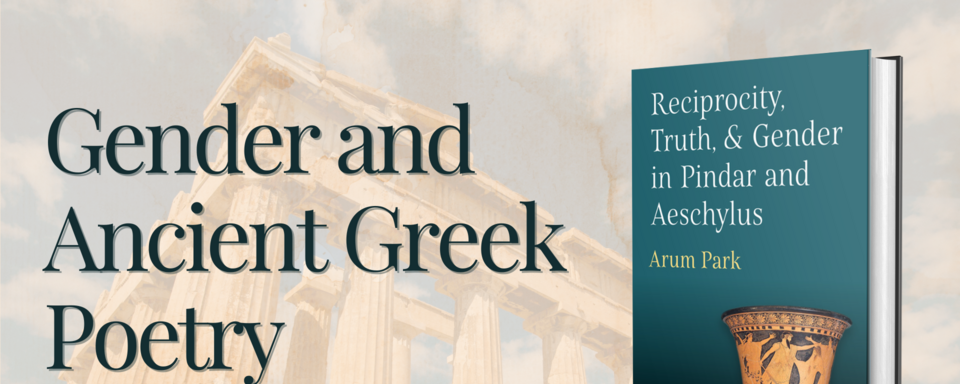Gender and Ancient Greek Poetry

This guest author post is written by Arum Park, author of Reciprocity, Truth, and Gender in Pindar and Aeschylus , from the University of Michigan Press, soon to be available in hardcover and open access.
One of the conventions of ancient Greek poetry is that the poet often opens his work with an invocation to a deity. For example, the earliest Greek poems, the Iliad and Odyssey, start this way:
μῆνιν ἄειδε θεὰ Πηληϊάδεω Ἀχιλῆος ( Iliad 1.1)
Sing, goddess, the wrath of Achilles, son of Peleus.
ἄνδρα μοι ἔννεπε, μοῦσα, πολύτροπον ( Odyssey 1.1)
Tell me, Muse, about the man of many turns.
Such invocations construct a world in which the poet purportedly relies on divinity to provide the content of his poem. By calling on the goddess or muse to relay the experiences of Achilles or Odysseus, the poet suggests that he is simply the conduit for words that will come from the gods and effectively shifts the credit for artistic creation onto them.
The Muses of Hesiod’s Theogony make this relationship even more blatant:
“ποιμένες ἄγραυλοι, κάκ᾽ ἐλέγχεα, γαστέρες οἶον,
ἴδμεν ψεύδεα πολλὰ λέγειν ἐτύμοισιν ὁμοῖα,
ἴδμεν δ᾽, εὖτ᾽ ἐθέλωμεν, ἀληθέα γηρύσασθαι.”
ὣς ἔφασαν κοῦραι μεγάλου Διὸς ἀρτιέπειαι·
καί μοι σκῆπτρον ἔδον, δάφνης ἐριθηλέος ὄζον
δρέψασαι θηητόν· ἐνέπνευσαν δέ μοι αὐδὴν
θέσπιν, ἵνα κλείοιμι τά τ᾽ ἐσσόμενα πρό τ᾽ ἐόντα,
καί με κέλονθ᾽ ὑμνεῖν μακάρων γένος αἰὲν ἐόντων,
σφᾶς δ᾽ αὐτὰς πρῶτόν τε καὶ ὕστατον αἰὲν ἀείδειν. (Hesiod, Theogony 26-34)
“Agrarian shepherds, wretched disgraces, mere bellies, we know how to speak lies like true things, and we know, when we wish, how to speak true things.” So the daughters of great Zeus, with their quick voices, spoke. And they plucked and gave me a staff, a marvelous branch of flourishing laurel; and they breathed a divine voice into me, so that I might tell of the future and the past, and they ordered me to hymn the race of the blessed, eternal gods, but to always sing the Muses first and last.
Aside from the Muses’ startling admission about their capricious attitude toward the truth (which has provoked copious scholarly rumination), these lines famously make explicit a relationship between the poet and his divine sources in which the poet functions as their mouthpiece. This presents a complicated and circular power dynamic: who should get the credit for the poem, the poet who speaks these words or the divinity who supposedly provides them? In this construction there is an interdependence between the poet and his patron deities because while the poet relies on them for his material, they rely on him to give voice to it.
This brings us to the relevance of gender in ancient Greek poetry. Why does gender matter in this context? The simple answer is that it is typically a female deity the poet invokes, so gender and gender difference are inherent in this complicated power dynamic between poet and patron deity that I have described. This gains greater significance given the male-dominated world of ancient Greek poetry, a world in which first-person female voices are nearly absent, and female perspectives, with very rare exception, are channeled through a male poetic creator. In these invocations to female deities, we have a situation in which the female goddess purportedly has power over the male poet…but it is only within the context of that poet’s work that she can exist and be heard. In this symbiotic relationship between the poet and his patron deity, the distinctions between poet and poetic creation and between male poet and female Muse are simultaneously pronounced and blurred.
The historian Joan Wallach Scott has observed that “gender is a primary way of signifying relationships of power” (Scott 1986, 1067). Furthermore, the hierarchies implicit in gender relations makes gender an illuminating lens through which to view many other types of relationships as well: “When historians look for the ways in which the concept of gender legitimizes and constructs social relationships, they develop insight into the reciprocal nature of gender and society and into the particular and contextually specific ways in which politics constructs gender and gender constructs politics” (Scott 1986, 1070).
Following her lead in recognizing the role of gender in many kinds of interactions, I have found gender to be a useful tool for understanding the intertwined relationship between a poet and his subject matter. In my forthcoming book Reciprocity, Truth, and Gender in Pindar and Aeschylus, gender has been helpful for illuminating the complex power dynamics inscribed in ancient Greek poetry, some of which I have touched on here. For me, it makes sense that a universal concept like gender, with its inherent complexities and shifting contours, would be present in the poetry I have studied and serve as a fruitful starting point for interpretation, and by illustrating the dynamics of gender within poetry and poetic creation, I hope to have contributed to arguments for the usefulness of gender for enriching and expanding knowledge.
References
Scott, Joan W. 1986. “Gender: A Useful Category of Historical Analysis.” The American Historical Review 91.5:1053-75.



